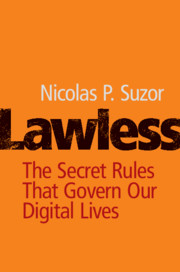Book contents
- Lawless
- Lawless
- Copyright page
- Contents
- Acknowledgments
- Part I A Lawless Internet
- 1 The Hidden Rules of the Internet
- 2 Who Makes the Rules?
- 3 The Internet’s Abuse Problem
- 4 Legal Immunity
- 5 How Copyright Shaped the Internet
- 6 Censorship
- 7 Lawless
- Part II A New Social Contract – Constitutionalizing Internet Governance
- Notes
- Index
7 - Lawless
from Part I - A Lawless Internet
Published online by Cambridge University Press: 22 June 2019
- Lawless
- Lawless
- Copyright page
- Contents
- Acknowledgments
- Part I A Lawless Internet
- 1 The Hidden Rules of the Internet
- 2 Who Makes the Rules?
- 3 The Internet’s Abuse Problem
- 4 Legal Immunity
- 5 How Copyright Shaped the Internet
- 6 Censorship
- 7 Lawless
- Part II A New Social Contract – Constitutionalizing Internet Governance
- Notes
- Index
Summary
Barlow’s declaration of independence was a cry for the preservation of the libertarian wild west of the early internet, an ideal of a space of limitless opportunity that its denizens could shape to their liking. He makes two claims here: first, that governments have no real power over the internet, which is a fundamentally unregulable, separate space, both outside of legal jurisdiction and practical reach of governments. The second – a moral claim – is that the rules of online social spaces would evolve to be better – more democratic, more free – than the rules of territorially bound nation-states.
Keywords
- Type
- Chapter
- Information
- LawlessThe Secret Rules That Govern Our Digital Lives, pp. 88 - 102Publisher: Cambridge University PressPrint publication year: 2019



